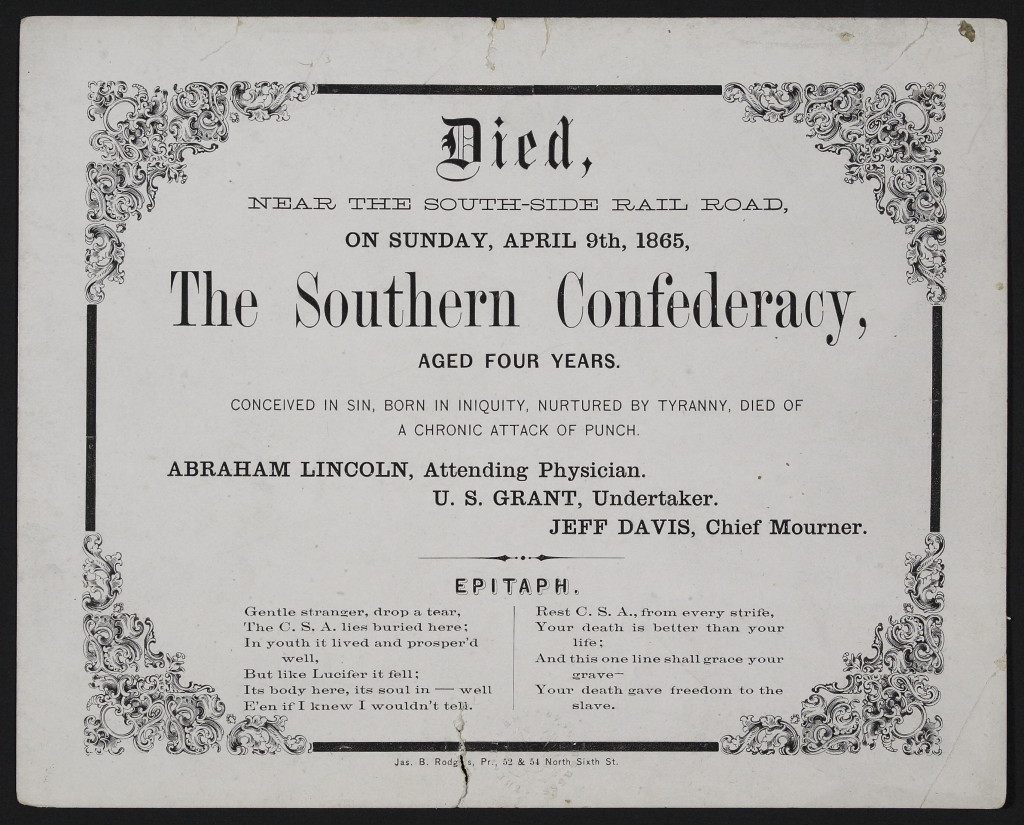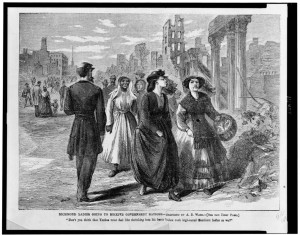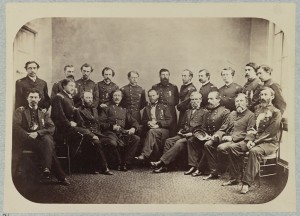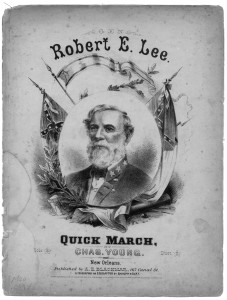An editorial wasn’t too happy that William T. Sherman kept reporters away from General Johnston’s April 26, 1865 surrender; apparently General Sherman thought the Confederate officers would be embarrassed giving up in front of the gawking Yankee press. America would never be reconstructed if the North remained servile to the South. The nation needed to be re-founded on mutual respect.
From The New-York Times May 10, 1865:
Rebel Sensitiveness.
Our government was conducted for eighty years on the principle that the great object of its existence and the first duty of every good citizen at the North was to keep Southerners in good humor. To say anything that hurt their feelings, to refuse them anything they demanded, to hint even in the mildest manner that the Free States could exist without them, that the withdrawal of their custom or countenance would not ruin everybody at the North and bring up the grass in all our streets, came at last to be considered little short of fratricidal. The theory of the advocates of this policy was, that it was thus and only thus that brotherly feeling between the people of the two sections could be kept up and the Union be preserved.
The actual result was that the mass of the Southern people conceived for the people of the North a contempt and hatred, for which there are few, if any, parallels in history. The very name of “Yankee” came to be a synonym in the Slave States for meanness and cowardice; and by a diligent nursing of these feelings on the part of the leaders, the whole South worked itself up into the belief, first, that it was impossible to live under the same government with such miserable wretches, and second, that there would be no difficulty in breaking-loose from them.
Now, although we have taken in these columns the strongest ground against all displays of vindictiveness against the Southern people, and although we would not willingly see the slightest trace of conquest linger either in our legislation or our manners, we have no hesitation in predicting, that unless Northern generals and politicians, and the Northern public, make up their minds that the “feelings” of the people in South Carolina or Virginia are of the same degree of respectability as those of the people in Massachusetts or Ohio, and no greater, and do not deserve and ought not to receive one whit more consideration, we shall never be able to live together in peace and harmony. There can be no sure and lasting foundation for union except mutual respect. It there is to be on our side the old fawning and servility and deference, and on the side of the South the old arrogance and assumption which fawning and servility always either breed or nurse, mutual respect cannot grow up, and we can never become in feeling, as we are in fact and in law, one people.
These remarks have been suggested to us by the extraordinary precaution adopted by Gen. SHERMAN to save the feelings of the officers of JOHNSTON’s army from being “hurt,” by refusing newspaper correspondents permission to be present at the formal surrender. These officers, have, without the smallest provocation, and in defence of a cause in which the civilized world, has been for very shame, if for no better reason, compelled to set the seal of execration, deluged this continent for four years in blood; have slain and crippled the flower of our young men, have witnessed, if not with approval with perfect indifference, the slow torture of unarmed prisoners, and have, during all that period, we venture to say, never put pen to paper without pouring out a flood of abuse on this people and government. They have protracted their resistance, too, as long as was possible. They lay down their arms now, simply and solely because the further prolongation of hostilities would entail their total destruction. Our armies have hunted them down; the people of the North have kept the ranks of these armies full; have supplied without stint everything that the struggle called for; have fought on for four long years in silence, under a great cloud of misrepresentation and misconstruction, with the whole of Europe uniting with the Confederacy in reviling and slandering them, without ever abating one jot of heart or hope.
And now, when the long agony is over, when this desperate horde has been driven to the wall, and forced with the bayonet at their throats, to agree to go home and earn a peaceful livelihood and obey the laws, their nerves are discovered to be so exceedingly delicate, their temperament so sensitive, and their pride a thing so tender, so worthy of our respect and consideration, that a newspaper cannot be permitted to report how they looked when they signed the capitulation, or even to describe the house in which it took place. And what makes this squeamishness all the more singular is that these very men, whose surrender has to be made pleasant for them in this way, are persons for whose “feelings” Congress has had so little respect as to confiscate their property, to declare them incapable of holding office, and who are, under the late President’s proclamation, stripped of all civil rights, and exposed to all the pains and penalties of treason. Can there be anything more maudlin than the tenderness which shrouds in mystery the surrender of his sword by a rebel, whom you have already outlawed, and on the atrocity of whose crime the press, the pulpit, and every member of the government, from the President down, have for years past been incessantly ringing changes?
We could excuse this scrupulous deference to their pride and fastidiousness, if their surrender were really an expression of contrition. We should be sorry to advocate, for anybody’s gratification, the exposure of any penitent to the gaze of unfriendly curiosity. But neither LEE nor JOHNSTON, nor any of their officers, have given the smallest sign of repentance. They have never uttered one expression of regret for the breach of their oaths, the desertion of their colors, and their four years’ struggle to destroy the government under which they were born, which educated them, and from which they had received nothing but kindness and consideration. They boast to this hour that they give up their swords only in obedience to stern necessity; because fighting has become useless, defeat certain. Under all these circumstances, we confess we can see in the pains taken to conceal the final evidence of the triumph of the law from the gaze of the public nothing but an unworthy and unbecoming revival of the flunkeyism which so long disgraced us, and something very like an impertinence to the army and the people.

CSA’s death “gave freedom to the slave.” ( Library of Congress, Rare Book and Special Collections Division, Alfred Whital Stern Collection of Lincolniana. )




